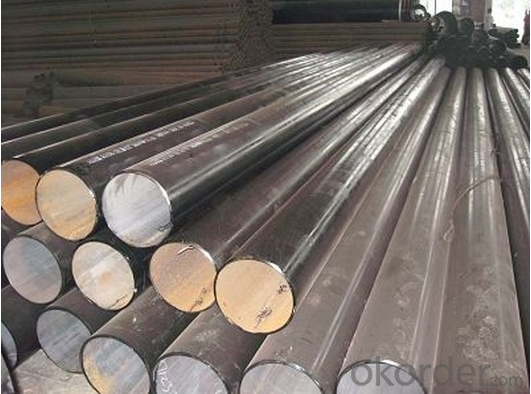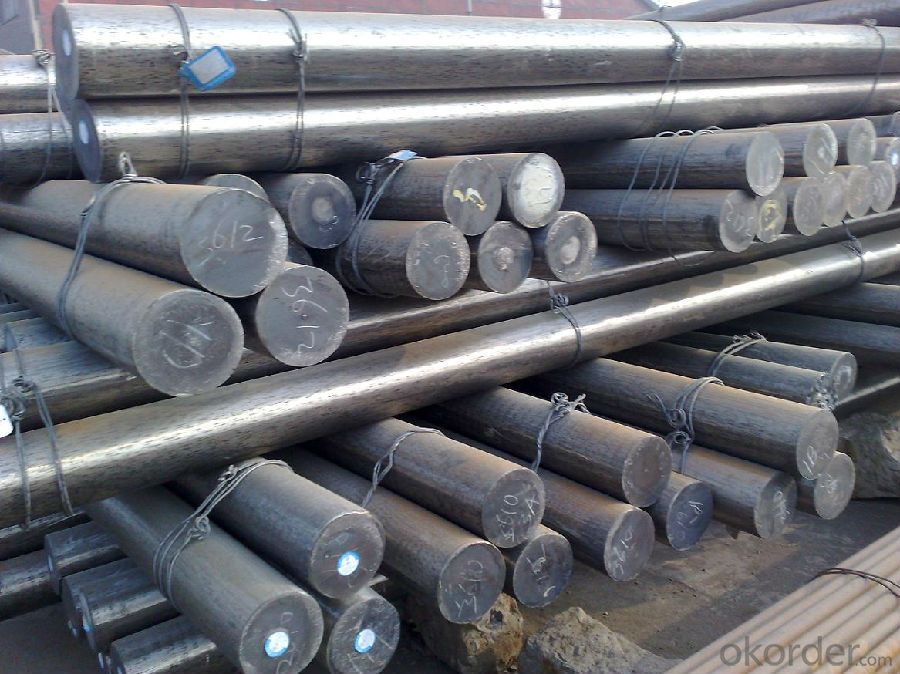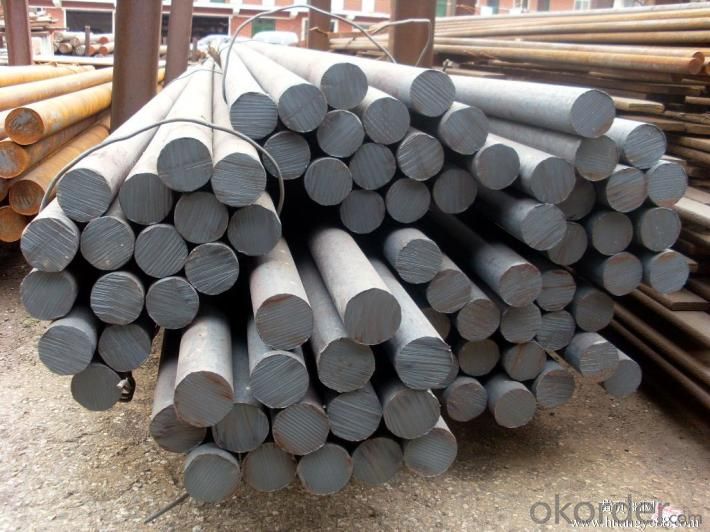SCM440 Alloy Steel Bar Hot-Rolled Bar
- Loading Port:
- Tianjin
- Payment Terms:
- TT OR LC
- Min Order Qty:
- 25 m.t.
- Supply Capability:
- 500000 m.t./month
OKorder Service Pledge
OKorder Financial Service
You Might Also Like
Item specifice
SCM440 Alloy Steel Bar Hot-Rolled Bar
Product Description:
1. Commodity: Round steel bar
3. Technical: Hot rolling
2. Length: Min. 5.8meter, according to requirement.
3. Diameter: 16mm-250mm
5. Packing: In Bundle or according to your requirements.
4. Standard: GB/T 3077-1999(42CrMo) ; JIS SCM440; DIN 42CrMo4 ; ASTM 4140 ; BS 708M40
Chemical Composition(%):
C | Si | Mn | Cr | Mo | Ni | P | S |
0.38-0.45 | 0.17-0.37 | 0.50-0.80 | 0.90-1.20 | 0.15-0.25 | ≤0.030 | ≤0.030 | ≤0.030 |
Standard:
GB | AISI | DIN | JIS | ISO |
42CrMo | 4140 | 42CrMo4 | SCM440 | 42CrMo4 |
Available Size:
Rolled round bar | φ20-120mm × L |
Forged round bar | φ130-195mm × L |
Application:used for various large-size or medium-size precision plastic mould and low melting
point alloy parts
The steel with high strength and toughness, hardenability is better also | |||||||
After conditioning treatment quenching deformation of small | |||||||
high fatigue limit and repeated impact resistance |
Quality Certificate:we can supply quality certificate
Packaging:standard seaworthy packing or as customer require
Delivery: In 7-10 days after we receive 30% deposite
Product show:



- Q:How does special steel perform in corrosive environments?
- The purpose of special steel is to excel in corrosive environments. This is achieved by incorporating a greater amount of alloying elements, like chromium, which generates a safeguarding oxide layer on the steel's surface. By doing so, the steel is shielded from direct contact with the corrosive elements present in the environment. In addition, special steel may contain other alloying elements such as molybdenum, nickel, or copper, which further enhance its ability to resist corrosion. These elements contribute to the steel's capacity to withstand various types of corrosion, including pitting, crevice corrosion, and stress corrosion cracking, which are commonly observed in corrosive environments. Moreover, special steel often undergoes treatments with diverse surface coatings or finishes that offer additional defense against corrosion. These coatings encompass materials like zinc, epoxy, or polymers, which establish an extra barrier between the steel and the corrosive elements. To summarize, special steel delivers exceptional performance in corrosive environments due to its abundant alloying elements, protective oxide layer, and supplementary surface coatings. It provides remarkable resistance against different forms of corrosion and guarantees the durability and dependability of structures or equipment operating in such environments.
- Q:How does special steel contribute to the electronics aftermarket industry?
- The electronics aftermarket industry greatly relies on special steel, which is crucial for producing high-performance materials necessary for various electronic components. It offers several contributions to the industry: 1. Durability and reliability: Special steel alloys possess exceptional strength, hardness, and resistance to wear and corrosion. This makes them ideal for manufacturing electronic parts that can withstand harsh operating conditions, ensuring the longevity and reliability of electronic devices, which is a vital requirement for the aftermarket industry. 2. Heat dissipation: Many electronic devices generate significant heat while in operation, which can negatively impact their performance and lifespan. Special steel alloys with excellent thermal conductivity properties enable efficient heat dissipation, preventing overheating and enhancing the overall performance of electronic components. 3. Precision manufacturing: Special steel alloys, such as stainless steel, can be precisely machined, allowing for the production of intricate and complex electronic parts. This is particularly important for the aftermarket industry, which often involves replacing or repairing specific components in electronic devices. 4. Electromagnetic shielding: Special steel alloys are useful for creating electromagnetic shielding, which is crucial in preventing interference and maintaining the integrity of electronic signals. This is especially significant for sensitive electronic equipment that may be affected by external electromagnetic fields. 5. Customization and adaptability: Special steel can be tailored to meet the specific requirements of electronic devices, facilitating the production of custom-made components. This versatility enables manufacturers in the electronics aftermarket industry to develop and offer a wide range of specialized products that cater to diverse consumer needs and preferences. In conclusion, special steel plays a significant role in the electronics aftermarket industry, providing durable, reliable, and high-performance materials necessary for manufacturing electronic components. Its unique properties enable the production of long-lasting and efficient devices, while also allowing for customization and adaptability to meet the ever-changing demands of the market.
- Q:How is the toughness of special steel measured?
- The toughness of special steel can be assessed by specific tests and methodologies that evaluate its capacity to absorb energy and withstand fractures. One widely used approach is the Charpy V-Notch (CVN) test, in which a notched specimen is struck by a pendulum hammer, and the energy absorbed during fracture is measured. The results are then expressed as the energy absorbed per unit area, typically in joules per square centimeter (J/cm²) or foot-pounds per square inch (ft-lb/in²). Another commonly employed test is the Izod test, which is similar to the CVN test but involves a different specimen geometry. Furthermore, engineers and manufacturers may also employ other mechanical tests such as tensile strength, impact strength, and fracture toughness measurements to evaluate the toughness of special steel. These tests are invaluable in determining the suitability of special steel for various applications, particularly those requiring exceptional resistance to impact or sudden loading.
- Q:How is high-temperature stainless steel used in the production of gas turbines?
- High-temperature stainless steel is used in the production of gas turbines due to its exceptional heat resistance and corrosion resistance properties. It is utilized to make critical components such as turbine blades, rotors, and casings that are exposed to extreme temperatures and harsh environments. This stainless steel helps gas turbines operate efficiently and reliably by withstanding high temperatures without losing strength or degrading, ultimately enhancing the performance and lifespan of gas turbines.
- Q:How does special steel contribute to the circular economy?
- Special steel contributes to the circular economy by enabling the recycling and reuse of materials. Its high durability and strength make it ideal for applications that require longevity and performance, allowing products made from special steel to have a longer lifespan. Additionally, special steel can be easily recycled and repurposed without losing its properties, reducing the need for virgin steel production and minimizing waste. By promoting a closed-loop system, special steel plays a crucial role in conserving resources, reducing environmental impact, and creating a more sustainable economy.
- Q:What are the main advantages of using special steel in the food processing industry?
- The main advantages of using special steel in the food processing industry are its exceptional strength and durability, resistance to corrosion and bacteria growth, and ease of cleaning and maintenance. Special steel is highly resistant to wear and tear, ensuring longevity and reducing the need for frequent replacements. Its corrosion resistance properties prevent contamination and maintain the integrity of food products. Additionally, special steel's smooth surface and non-porous nature make it easy to clean, ensuring optimal hygiene standards in food processing facilities.
- Q:What are the different methods of surface electroplating for special steel?
- There are several methods of surface electroplating for special steel, including electroless plating, electroplating by immersion, barrel plating, and rack plating. Electroless plating is a chemical process that uses a reducing agent to deposit a layer of metal onto the steel surface. Electroplating by immersion involves immersing the steel in an electrolyte bath and applying an electric current to deposit a metal coating. Barrel plating is a method where the steel parts are placed in a rotating barrel along with the plating solution, creating a tumbling action that ensures an even coating. Rack plating involves suspending the steel parts on a rack and immersing them in the plating bath. Each method has its own advantages and is chosen based on the specific requirements and characteristics of the special steel being plated.
- Q:How is special steel manufactured?
- Special steel is manufactured through a complex process that involves melting, refining, and shaping steel with precise chemical compositions and desired properties. This may include alloying steel with various elements, such as chromium, nickel, or molybdenum, to enhance its strength, corrosion resistance, or heat resistance. The steel is then formed into desired shapes through techniques like rolling, forging, or casting. The manufacturing process also involves strict quality control measures to ensure the final product meets the specific requirements of various industries, such as automotive, aerospace, or construction.
- Q:How does special steel perform in casting applications?
- Special steel performs exceptionally well in casting applications due to its unique properties and characteristics. Firstly, special steel has excellent heat resistance, allowing it to withstand high temperatures during the casting process. This is crucial as casting involves melting the metal and pouring it into a mold, which requires materials that can endure extreme heat without losing their structural integrity. Special steel's high heat resistance ensures that it maintains its shape and strength throughout the casting process. Additionally, special steel possesses remarkable strength and toughness. This is vital in casting applications as it ensures that the final cast product will have the necessary strength and durability to withstand various operational conditions. Special steel's exceptional strength also allows for the creation of intricate and complex castings, enabling the production of components with intricate designs and precise dimensions. Moreover, special steel exhibits superior corrosion resistance. This property is especially beneficial in casting applications that involve exposure to harsh environments or corrosive substances. Special steel's resistance to corrosion ensures that the castings will remain intact and functional for an extended period, reducing maintenance and replacement costs. Furthermore, special steel offers excellent wear resistance. This property is crucial in casting applications where the castings will be subjected to friction, abrasion, or impact. Special steel's high wear resistance minimizes material loss, extends the lifespan of the castings, and ensures optimal performance in demanding conditions. Lastly, special steel has excellent machinability, making it easier to shape, cut, and finish during the casting process. This property allows for precise and accurate casting, ensuring that the final product meets the required specifications and tolerances. In conclusion, special steel is ideal for casting applications due to its exceptional heat resistance, strength, corrosion resistance, wear resistance, and machinability. These properties enable the production of high-quality and reliable castings that can withstand various operational conditions and deliver optimal performance.
- Q:How does special steel contribute to the aerospace racing industry?
- Special steel plays a crucial role in the aerospace racing industry by offering superior strength, durability, and performance characteristics that are essential for the demanding conditions and requirements of high-speed racing. One of the primary contributions of special steel to the aerospace racing industry is its ability to withstand extreme temperatures and pressures. Special steel alloys, such as nickel-based superalloys, are specifically designed to maintain their mechanical properties under high temperatures, making them ideal for the intense heat generated during racing. These alloys exhibit excellent creep resistance, allowing the components to withstand prolonged exposure to elevated temperatures without deformation or failure. Moreover, special steel alloys possess exceptional strength-to-weight ratios, providing a competitive advantage in the aerospace racing industry. The high strength of these alloys allows for the design and construction of lighter and more efficient racing components, such as engine parts, landing gears, and structural elements. This reduces the overall weight of the aircraft, enhancing its performance and speed while maintaining structural integrity and safety. Additionally, special steel offers excellent corrosion resistance, which is vital in the aerospace racing industry. The harsh conditions experienced during racing, including exposure to moisture, chemicals, and atmospheric elements, can lead to corrosion and deterioration of critical components. Special steel alloys, such as stainless steel, are highly resistant to corrosion, ensuring the longevity and reliability of the racing aircraft. Furthermore, special steel's unique metallurgical properties, such as high fatigue and fracture resistance, contribute to the safety and reliability of the aerospace racing industry. The high fatigue strength of these alloys allows them to withstand repeated loading and unloading cycles without developing cracks or failures. This is crucial in high-speed racing, where components are subjected to significant stress and strain. Special steel's exceptional fracture toughness also ensures that any potential cracks or flaws do not propagate catastrophically, minimizing the risk of catastrophic failures during racing. In conclusion, special steel plays a pivotal role in the aerospace racing industry by offering superior strength, durability, and performance characteristics. Its ability to withstand extreme temperatures, provide excellent strength-to-weight ratios, resist corrosion, and exhibit high fatigue and fracture resistance makes it an indispensable material for the construction of racing aircraft components. The use of special steel in the aerospace racing industry ultimately enhances the performance, speed, safety, and reliability of racing aircraft, pushing the boundaries of aerospace technology and propelling the industry forward.
1. Manufacturer Overview |
|
|---|---|
| Location | |
| Year Established | |
| Annual Output Value | |
| Main Markets | |
| Company Certifications | |
2. Manufacturer Certificates |
|
|---|---|
| a) Certification Name | |
| Range | |
| Reference | |
| Validity Period | |
3. Manufacturer Capability |
|
|---|---|
| a)Trade Capacity | |
| Nearest Port | |
| Export Percentage | |
| No.of Employees in Trade Department | |
| Language Spoken: | |
| b)Factory Information | |
| Factory Size: | |
| No. of Production Lines | |
| Contract Manufacturing | |
| Product Price Range | |
Send your message to us
SCM440 Alloy Steel Bar Hot-Rolled Bar
- Loading Port:
- Tianjin
- Payment Terms:
- TT OR LC
- Min Order Qty:
- 25 m.t.
- Supply Capability:
- 500000 m.t./month
OKorder Service Pledge
OKorder Financial Service
Similar products
New products
Hot products
Related keywords




























